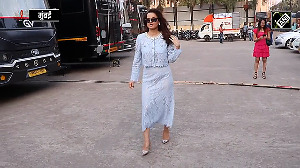The Supreme Court on Friday revived a petition challenging a decision to drastically cut the annual fee for students in IIMs as the Union government refused to give an undertaking that reduction in fee would not lead to its interference in the 'autonomy' of the business schools.
In view of the inability expressed by the Centre to give the written undertaking, a Bench comprising Chief Justice V N Khare, Justice S B Sinha and Justice S H Kapadia decided to revive a PIL filed by advocate Sandeep and two others and recalled its February 27 order disposing of the PIL.
However, Additional Solicitor General Mukul Rohatgi said the Government still stood by the statement it made on February 27 that reduction in the annual fee from Rs 150,000 to Rs 30,000 would not amount to its interference in the functioning of the business schools of excellence.
He indicated that the government was ready to make a promise not to interfere in the functioning of the institutions but had reservations over the use of word 'autonomy' in place of 'functioning' as it had very wide connotation.
In view of the inability of the Government to tender an undertaking, the Court issued notice to the Centre on the application of the petitioners seeking revival of the PIL.
While fixing April 8 for hearing on the PIL, the Bench reverted back to its February 16 order through which it had questioned the locus standi of the petitioners to challenge the February 5 decision of the HRD ministry headed by Murli Manohar Joshi to reduce the fees and had asked them to supply the balance sheets of the IIMs.
When the application was listed on March 12, the court had asked the Additional Solicitor General to take instructions whether it could give an undertaking not to interfere with the 'autonomy' of the IIMs.
Rohatgi said: "The government has thought over the matter and it is not possible to give guarantee as proposed by the petitioners."
Recording the inability of the government to give the undertaking, the Bench revived the February 16 and allowed the petitioners to implead the IIMs as parties to the case.
On February 16, the court during the hearing of the PIL had observed that these institutes of excellence should not be accessible only to the elite section of the society and sought to know the basis for charging an annual fee of Rs 150,000 per student.
"Who are you, what is your locus?" the Bench had asked and observed, "if the IIMs were satisfied with the decision of the government, who are you to challenge it?"
The petitioners had contended that the government by reducing the fees of the students wanted to increase the dependence of these institutes on it for funds and thereby opening avenues for interference.
However, the court had said it would proceed further with the petition only after they provided details of the components on the basis of which fee was being charged from the students, the subsidy it gets from the government and the balance sheet of the institutions for the last six years.
On February 27, the court had virtually endorsed the Centre's decision to cut IIM fee after it promised not to interfere in the running of these business schools of excellence.
The Bench, in view of the promise given by the Government, disposed of a public interest litigation filed by three members of IIM alumni challenging the February 5 decision of HRD ministry.
On March 12, the court gave a week's time to the Centre to clarify its stand on the commitment not to interfere with the functioning of the prestigious business schools and to provide adequate funds to meet the shortfall in the funds due to reduction in fees.
Rohatgi had said if the 'autonomy' word was added to the undertaking, any decision taken by the government vis-a-vis these business schools would result in contempt proceedings.
The Chief Justice had said that if the government gave the undertaking not to interfere in the functioning of the IIMs, the court would clarify that any future litigation on the issue of interference in the 'autonomy' of the institutes would have to be agitated before appropriate forums as a separate litigation.






 © 2025 Rediff.com -
© 2025 Rediff.com -